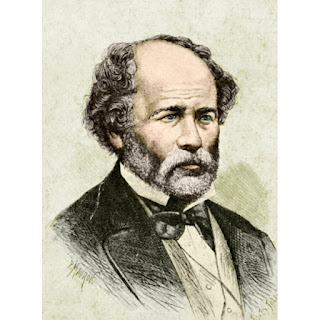For the laying of the cornerstone for the University of the South, on 10 October 1860, Matthew Fontaine Maury gave this speech before 8 bishops, 200
clergy and 4,000 laymen concerning my personal belief in religion as the basis
for any comprehensive understanding of the natural world.
Physical
geography makes the whole world kin. Of all the departments in the domains of
physical science, it is the most Christianising. Astronomy is grand and
sublime; but astronomy overpowers with its infinities, overwhelms with its immensities.
Physical geography chars with its wonders, and delights with the benignity of
its economy. Astronomy ignores the existence of man; physical geography confesses
that existence and is based on the Biblical doctrine that the earth was made
for man. Upon no other theory can its phenomena be reconciled. …
Here, the
schools which are soon to be opened … the masters of this newly ordained science
will teach our sons to regard some of the commonest things as the most
important agents in the physical economy of the planet. They are also might
ministers of the Creator. …
I have
been blamed by men of science, both in this country and in England, for quoting
the Bible, they say, was not written for scientific purposes, and is therefore
no authority in matters of science. I beg pardon: the Bible is authority
in everything it touches. What would you think of the historian who should refuse
to consult the historical records of the Bible because the Bible was not written
for the purposes of history? The Bible is true: and science is true … they are
both true; … and when your man of science with vain and hasty conceit announces
the discovery of disagreement between them, rely upon it the fault is not the Witness
or His records, but with the “worm” who essay to interpret evidence with he
does not understand. …
As a
student of physical geography, I regard earth, sea, air, and water as parts of
a machine, pieces of a mechanism, not made with hands, but to which, nevertheless,
certain offices have been assigned in the terrestrial economy. It is good and
profitable to seek to find these offices … and when, after patient research, I
am led to the discovery of any one of them, I feel with the astronomer of old,
as though I had “thought one of God’s thoughts,”—and tremble. Then as we
progress with our science we are permitted now and then to point out here and
there in the physical machinery of the earth a design of the Great Architect
when He planned it all. …
Had I time
I might show how mountains, deserts, winds, and water, when treated by this
beautiful science in our schools, and even before man had endowed it with a
name, saw and appreciated its dignity—the for each one has its part to perform
in the great concert of nature. …
What have we
heard chanted here in this grove by a thousand voices this morning?—A song of
praise, such as these hills since the morning stars sang together—the BENEDICTINE
of our mother Church, invoking the very agents whose workings and offices it is
the business of the physical geographer to point out! In her services she
teaches her children in their songs of praise to call upon certain physical
agents, principles in this newly-established department of human
knowledge—upon the waters above the firmament; frost and cold; ice and snow;
night and day; light and darkness; lightning and clouds; mountains and hills;
green things; fowls of the air; with beasts and cattle—to bless, praise, and
magnify the Lord!


